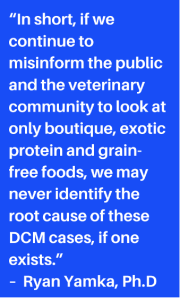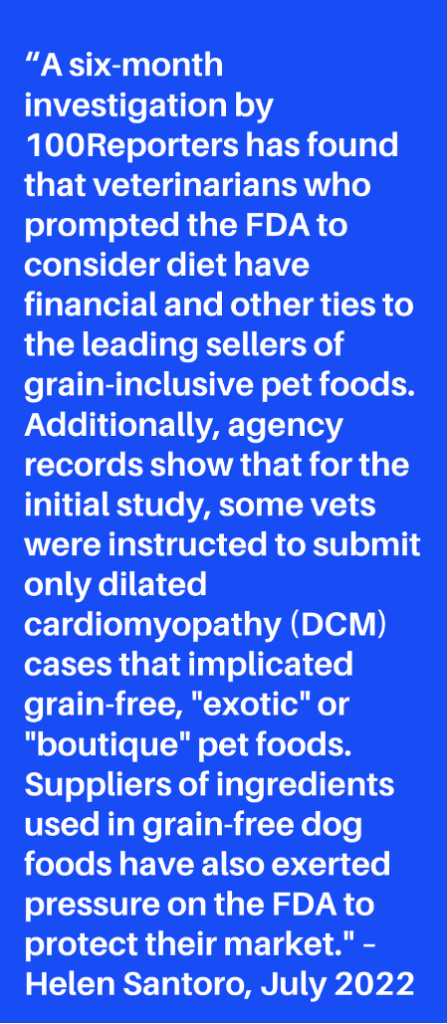
Was It Bad Science or Shameless Greed and Fraud?
by Don Hanson
There is no scientific evidence to support the claim that feeding your dog grain-free or BEG (boutique, exotic ingredient, grain-free) diets puts them at increased risk for dilated cardiomyopathy (DCM), according to an update on the U.S. Food and Drug Administration’s (FDA) website (FDA, 2022).
 This is excellent news! People can now feed their pets a grain-free or BEG diet without fear. However, it is also tragic news, as how this investigation was handled was a travesty. It caused financial harm to many small companies, and it caused many to lose trust in the FDA, the veterinary community and the media.
This is excellent news! People can now feed their pets a grain-free or BEG diet without fear. However, it is also tragic news, as how this investigation was handled was a travesty. It caused financial harm to many small companies, and it caused many to lose trust in the FDA, the veterinary community and the media.
Many interpreted the FDA investigation announced three and a half years prior (FDA, 2018) to conclude that grain-free and BEG pet foods were harmful. Unfortunately, the FDA and others involved did not attempt to correct this misinterpretation. While we do not know the exact motivation behind this investigation, an article published by the website 100Reporters (Santoro, 2022) revealed an email sent to the FDA in June of 2018 by Dr. Lisa Freeman, a veterinary nutritionist at Tufts University. In my opinion, the language in Freeman’s email suggests her intent. Freeman requested that veterinarians report cases of DCM to the FDA “[i]f patient is eating any diet besides those made by well-known, reputable companies or if eating a boutique, exotic ingredient, or grain-free (BEG) diet” (Freeman, 2018).
Dr. Freeman’s email troubles me. Excluding diets made by what Freeman calls “reputable companies” is poor science. A scientific study would look at food from all manufacturers. Additionally, implicating guilt without evidence is unethical. Freeman’s email also suggests that, at least to her, this investigation goes beyond grain-free foods to include foods that contain nontraditional animal proteins and foods she has labeled as BEG diets.
Dr. Freeman failed to define “reputable companies.” However, an article she co-authored in the Journal of the American Veterinary Medical Association (JAVMA), an organization of alleged scientists dedicated to healing and the scientific method, in December of 2018 indicates that both Nestlé Purina PetCare and Royal Canin have funded her research (Freeman et al., 2018). Therefore, I believe it is fair to conclude that they are among the “reputable companies”she has prejudged as innocent. Was Dr. Freeman’s bias against the small, independent pet food companies related to who funded her research? That is something that most definitely warrants an investigation.
The title of the JAVMA article, “Diet-Associated Dilated Cardiomyopathy in Dogs: What Do We Know?” is ironic because many who read the article believed it presented facts that BEG diets cause DCM. Grain-free diet–associated DCM did not have evidence to support it when the article was published, and it was later dismissed in the FDA’s announcement on December 23, 2022. Although the article was published in the commentaries section of JAVMA, many who read it seemed to view and share it with the same reverence they would give to an article that had been independently peer reviewed. If JAVMA had acted responsibly, it would have immediately issued a retraction.
Almost a year later, the FDA announced an update to its investigation that named 16 dog food brands that may, according to the FDA, cause DCM in dogs (FDA, 2019). Within days, this report was criticized by leading veterinarians and animal nutritionists. Dr. Jean Dodds, a foremost expert in pet healthcare, stated, “This release has caused national and international concern bordering upon hysteria, without any admitted reason for listing these food brands. In our opinion, the listing of specific brands was premature and unwarranted” (Hemopet, 2019). She also noted: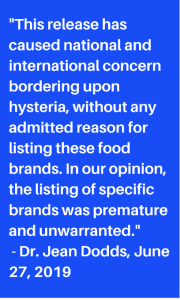
In essence, we agree with the FDA that the association between diet and DCM in dogs is a complex scientific issue that may involve multiple factors. However, we think the FDA is causing public panic and overt veterinary concern by not presenting definitive conclusions but implying risk by inference in listed certain pet food brands.
Why is the agency not requesting the same laboratory work of healthy dogs without a known breed disposition for DCM that are eating grain-free diets? Thus far, this sample size seems relatively small and a control group is nonexistent.
Why is the agency not actively requesting laboratory work of dogs diagnosed with DCM, without a known breed disposition to DCM, and that were eating grain-containing diets at the time of diagnosis? (Hemopet, 2019) [emphasis added].
In another article, Ryan Yamka, PhD, a board certified companion animal nutritionist, shared his concerns:
… FDA reported all pet food brands named in DCM reports submitted to the agency. Unfortunately, they only graphed the top 16 brands, and this is what took over the headlines in the press. If the press and others took the time to actually review all the cases reported to FDA (submitted through April 30, 2019), they would have seen other brands like Purina ONE, Hill’s Pet Nutrition, Halo, V-Dog, Lotus and others. What is more important is that the majority of brands named in the report are not boutique brands and can be found in large pet specialty, grocery and mass market stores. Thus, the “B” in BEG is inaccurate and a misnomer.
Of the cases investigated, 75% were common protein sources (chicken being No. 1), 24% were novel protein sources and 1% were vegetarian foods. In case you were wondering, kangaroo was only 9.3% of the total cases. Thus, the “E” for exotic in the acronym BEG is also inaccurate and a misnomer.
In short, if we continue to misinform the public and the veterinary community to look at only boutique, exotic protein and grain-free foods, we may never identify the root cause of these DCM cases, if one exists. The veterinary community should lose the mind-set that they are caused by so-called BEG foods. Instead, if signs of DCM do exist, veterinarians should go through the battery of tests to confirm the presence of DCM and report it regardless of what the dog is consuming (Yamka, 2019) [emphasis added].
A review paper was later published by the Journal of Animal Science. Following are highlights of the essential parts of the paper:
… boutique diets, defined as produced by a small manufacturer, have been implicated in association with DCM (Freeman et al., 2018; FDA, 2019a). However, when the FDA report is broken down into which pet food manufacturers made the called-out diets (FDA, 2019a), 49% of the brands listed were made by one of the six largest pet food manufacturers in North America (Petfood Industry, 2019). Given that almost half of the brands listed on the FDA report (FDA, 2019a) on June 27, 2019, are not manufactured by boutique pet food companies (Figure 5), it is unlikely that an association can be made to DCM.
The FDA figure lists the top seven proteins of the implicated diets: chicken, lamb, salmon, whitefish, turkey, beef, and pork. These comprised 76% of the diets named in the FDA report (FDA, 2019a), which are not exotic pet food proteins (Case et al., 2011) (McCauley et al., 2020) [emphasis added].
The conclusion of this paper says everything we need to know about the FDA’s investigation, and the only logical conclusion is from a scientific perspective—the research was seriously flawed.
Recently, a correlation between diets with specific characteristics, such as, but not limited to, containing legumes, grain-free, novel protein sources and ingredients, and smaller manufactured brands, to DCM has come under scrutiny by academic researchers and the FDA. The use of the acronym “BEG” and its association with DCM are without merit because there is no definitive evidence in the literature. At this time, information distributed to the veterinary community and the general public has been abbreviated synopses of case studies, with multiple variables and treatments, incomplete medical information, and conflicting medical data and opinions from veterinary nutrition influencers. Also, in past literature, sampling bias, overrepresentation of subgroups, and confounding variables in the data weaken this hypothesis. Additionally, based on current literature, the incidence of DCM in the overall dog population is estimated to be between 0.5% and 1.3% in the United States. However, the FDA case numbers (560 dogs) are well below the estimated prevalence. Therefore, it is impossible to draw any definitive conclusions, in these cases, linking specific diets or specific ingredients to DCM (McCauley et al., 2020) [emphasis added].
On September 29, 2020, Kansas State University hosted a virtual symposium called the Scientific Forum Exploring Causes of Dilated Cardiomyopathy in Dogs. The symposium allowed scientists to present their research on DCM and its relations to grain-free or BEG diets. One of the facts discussed was, “… there are an estimated 77 million pet dogs in the US, and most have been consuming pet food of all types without developing DCM” (Santoro, 2022) [emphasis added]. The 2020 symposium concluded,
FDA has no definitive information indicating that the diets are inherently unsafe and need to be removed from the market, but we are continuing to work with stakeholders in assessing how the diets may interact with other factors that may be impacting non-hereditary DCM (FDA, 2022) [emphasis added].
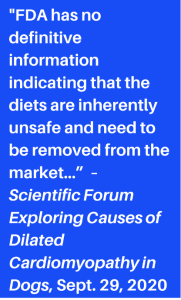 This conclusion was made more than two years before the FDA’s announcement on December 23, 2022, reaching the same conclusion. So why the delay in announcing that grain-free and BEG foods were not the problem?
This conclusion was made more than two years before the FDA’s announcement on December 23, 2022, reaching the same conclusion. So why the delay in announcing that grain-free and BEG foods were not the problem?
In her investigative article, “Did Industry Funding Influence an FDA Investigation into Canine Heart Disease and Grain-Free Dog Food?” Helen Santoro (2022) asks the questions the media should have been asking in July of 2018. A few quotes from Santoro’s article are highlighted below, but if you care about what you feed your pet, I recommend you read the article in its entirety.
A six-month investigation by 100Reporters has found that veterinarians who prompted the FDA to consider diet have financial and other ties to the leading sellers of grain-inclusive pet foods. Additionally, agency records show that for the initial study, some vets were instructed to submit only dilated cardiomyopathy (DCM) cases that implicated grain-free, “exotic” or “boutique” pet foods. Suppliers of ingredients used in grain-free dog foods have also exerted pressure on the FDA to protect their market.
FDA records obtained under the Freedom of Information Act, however, indicate that those reports may not have been fully representative of cases seen at the Tufts clinic.
Freeman has a long history of receiving funding from pet food companies, including Nestlé Purina Petcare, Hill’s Pet Nutrition, and Mars Petcare. This is common within the field of animal nutrition, as a large portion of funding for studies on pet food and nutrition come from big pet food companies.
Purina, Hill’s and Mars produce some of the most popular grain-inclusive dog foods, including Purina Pro Plan and Purina ONE, Hill’s Science Diet and IAMS Proactive Health (IAMS is owned by Mars). They all also sell grain-free diets. However, grain-inclusive foods are key drivers of dry dog food sales across the industry (Santoro, 2022) [emphasis added].
If the intent of the FDA investigation into DCM and grain-free foods was to damage the small pet food manufacturers, they were successful. Those small companies were the innovators who introduced grain-free formulas in response to dogs who were intolerant of the cheap grains and more common proteins, such as chicken, used in so many dog foods. Unfortunately, as reported by Nielsen IQ, “… total grain-free dry dog food has been on a steady decline since June 2018 …,” and, “Brands who were named directly in the FDA’s investigation experienced steeper declines up until the last half of 2020” (Santoro, 2022). The small, independent companies have been the real innovators in pet food for the past two decades. So, was the FDA investigation initiated by the big companies to shut that down? It’s a question I have asked myself every day since July 2018.
On Friday, December 23, 2022, the FDA indicated that it is ending updates on its four-and-a-half-year investigation into DCM and grain-free pet food because the data do not support its previous assertion that the feeding of grain-free pet foods causes DCM. As stated by Debbie Phillips-Donaldson of PetFoodIndustry.com,
It’s a classic PR tactic: releasing less-than-positive news on a Friday in hopes it will go unnoticed leading into the weekend. In the case of the Food and Drug Administration’s (FDA) announcement that it is ending updates on its dilated cardiomyopathy (DCM)/grain-free pet food investigation “unless there is meaningful new scientific information to share,” the news came out the Friday before Christmas, effectively burying it over the long holiday weekend and season” (Phillips-Donaldson, 2023) [emphasis added].
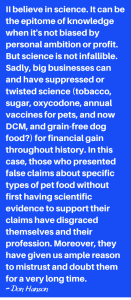 The FDA and the veterinarians who initiated this “investigation” were not the only ones complicit in this farce. The national and local news media latched on to both the FDA’s and Tufts University’s announcements in 2018 like flies on dog feces. Without fact-checking, and apparently presuming an undeserved trust of the FDA and Tufts University, the media reported the story, never asking the critical questions asked by others. Instead, the press parroted back Dr. Freeman’s words, making the term, “boutique, exotic ingredient, or grain-free (BEG) diet,” part of the new vocabulary. By doing so, they severely damaged the reputation of many companies making grain-free and BEG foods. Moreover, the media found these companies guilty and punished them before the FDA proved its case. Now that these companies have been found not guilty, will the FDA, Dr. Freeman and the media compensate them for their losses?
The FDA and the veterinarians who initiated this “investigation” were not the only ones complicit in this farce. The national and local news media latched on to both the FDA’s and Tufts University’s announcements in 2018 like flies on dog feces. Without fact-checking, and apparently presuming an undeserved trust of the FDA and Tufts University, the media reported the story, never asking the critical questions asked by others. Instead, the press parroted back Dr. Freeman’s words, making the term, “boutique, exotic ingredient, or grain-free (BEG) diet,” part of the new vocabulary. By doing so, they severely damaged the reputation of many companies making grain-free and BEG foods. Moreover, the media found these companies guilty and punished them before the FDA proved its case. Now that these companies have been found not guilty, will the FDA, Dr. Freeman and the media compensate them for their losses?
From the beginning, the veterinary community at large, and possibly the vet who cares for your pet, was singing from the FDA/Freeman hymnal, proselytizing that ignorant pet parents must avoid feeding BEG diets and should only feed food made by “reputable companies.” Unfortunately, some veterinarians and their staff were not only telling this to people in person, but also posting it on their websites, where, in some cases, these false statements still exist today, in January of 2023. Veterinarians are supposed to be scientists, but they acted like sheep in this case.
Let’s hope that the news media and the veterinary community are not as complicit in burying this debacle as they were in promoting it.
I believe in science. It can be the epitome of knowledge when it’s not biased by personal ambition or profit. But science is not infallible. Sadly, big businesses can and have suppressed or twisted science (tobacco, sugar, oxycodone, annual vaccines for pets, and now DCM and grain-free dog food) for financial gain throughout history. In this case, those who presented false claims about specific types of pet food without first having scientific evidence to support their claims have disgraced themselves and their profession. Moreover, they have given us ample reason to mistrust and doubt them for a very long time.
A version of this article was previously published in Downeast Dog News.
References
FDA. (2018). FDA investigating potential connection between diet and cases of canine heart disease. U.S. Food and Drug Administration. Retrieved February 22, 2023, from https://wayback.archive-it.org/7993/20201222194256/https:/www.fda.gov/animal-veterinary/cvm-updates/fda-investigating-potential-connection-between-diet-and-cases-canine-heart-disease
———. (2019). FDA investigation into potential link between certain diets and canine dilated cardiomyopathy. U.S. Food and Drug Administration. Retrieved February 22, 2023, from https://www.fda.gov/animal-veterinary/outbreaks-and-advisories/fda-investigation-potential-link-between-certain-diets-and-canine-dilated-cardiomyopathy
———. (2022). Questions & answers: FDA’s work on potential causes of non-hereditary DCM in dogs. U.S. Food and Drug Administration. Retrieved February 22, 2023, from https://www.fda.gov/animal-veterinary/animal-health-literacy/questions-answers-fdas-work-potential-causes-non-hereditary-dcm-dogs
Freeman, L. M. (2018). A broken heart: Risk of heart disease in boutique or grain-free diets and exotic ingredients. Petfoodology, Cummings School of Veterinary Medicine, Tufts University. https://vetnutrition.tufts.edu/2018/06/a-broken-heart-risk-of-heart-disease-in-boutique-or-grain-free-diets-and-exotic-ingredients/
Freeman, L. M., Stern, J. A., Fried, R., Adin, D. B., & Rush, J. E. (2018). Diet-associated dilated cardiomyopathy in dogs: What do we know? Journal of the American Veterinary Medical Association, 253(11), 1390–1394. https://doi.org/10.2460/javma.253.11.1390
Hemopet. (2019). Hemopet responds to the FDA implicating 16 brands of dog food that may cause heart disease in dogs. Retrieved February 22, 2023, from https://hemopet.org/fda-updates-dcm-heart-disease-dogs/
McCauley, S. R., Clark, S. D., Quest, B. W., Streeter, R. M., & Oxford, E. M. (2020). Review of canine dilated cardiomyopathy in the wake of diet-associated concerns. Journal of Animal Science, 98(6), 1–20.https://doi.org/10.1093/jas/skaa155
Phillips-Donaldson, D. (2023, January 5). FDA’s DCM probe starts with a roar, ends with a whimper. PetFoodIndustry.com. https://www.petfoodindustry.com/blogs/7-adventures-in-pet-food/post/11878-fdas-dcm-probe-starts-with-a-roar-ends-with-a-whimper
Santoro, H. (2022). Did industry funding influence an FDA investigation into canine heart disease and grain-free dog food? 100Reporters. https://100r.org/2022/07/did-industry-funding-influence-an-fda-investigation-into-canine-heart-disease-and-grain-free-dog-food/
Yamka, R. (2019, July 30). ‘BEG’ pet food does not equal DCM. PetFoodIndustry.com. https://www.petfoodindustry.com/blogs/10-debunking-pet-food-myths-and-misconceptions/post/8369-beg-pet-food-does-not-equal-dcm
Further Reading
FDA Center for Veterinary Medicine. (2020). FDA update on dilated cardiomyopathy: Fully and partially recovered cases [PowerPoint slides]. Kansas State University’s Scientific Forum Exploring Causes of Dilated Cardiomyopathy in Dogs. https://www.ksvdl.org/resources/documents/dcm-forum/FDA_KSU-Science-Forum-slides_09-29-2020.pdf
Green Acres Kennel Shop Blog. (2018, July 23). Pet nutrition—Grain-free foods and FDA reports of increased heart disease in dogs. https://blog.greenacreskennel.com/2018/07/22/pet-nutrition-grain-free-foods-and-fda-reports-of-increased-heart-disease-in-dogs/
———. (2018, September 29). Podcast—Is feeding a grain-free food to our dogs dangerous?, with Linda Case, MS. https://blog.greenacreskennel.com/2018/09/29/podcast-is-feeding-a-grain-free-food-to-our-dogs-dangerous-with-linda-case-ms/
———. (2018, September 29). UPDATE! Pet nutrition—Grain-free foods and FDA reports of increased heart disease in dogs–WDJ blog post. https://blog.greenacreskennel.com/2018/08/06/update-pet-nutrition-grain-free-foods-and-fda-reports-of-increased-heart-disease-in-dogs-wdj-blog-post/
———. (2019, April 12). Shared blog post—FDA updates on heart disease in dogs–Hemopet–Dr. Jean Dodds. https://blog.greenacreskennel.com/2019/04/12/shared-blog-post-fda-updates-on-heart-disease-in-dogs-hemopet-dr-jean-dodds/
———. (2019, July 7). FDA update on heart disease in dogs & what should you do? https://blog.greenacreskennel.com/2019/07/07/fda-update-on-heart-disease-in-dogs-what-should-you-do/
———. (2019, July 17). Shared articles—More on the FDA, DCM and pet food. https://blog.greenacreskennel.com/2019/07/10/shared-articles-more-on-the-fda-dcm-and-pet-food/
———. (2019, July 20). Podcast—Pet’s in the news–No. 4 Pet Food, DCM and the FDA. https://blog.greenacreskennel.com/2019/07/26/podcast-pets-in-the-news-no-4-pet-food-dcm-and-the-fda/
———. (2019, July 31). Shared articles—Do the vets behind the FDA investigation have a conflict of interest? https://blog.greenacreskennel.com/2019/07/31/shared-articles-do-the-vets-behind-the-fda-investigation-have-a-conflict-of-interest/
———. (2019, August 8). Podcast—DCM, the FDA, and dog food—The science and the hype, with canine nutritionist Linda Case. https://blog.greenacreskennel.com/2019/08/08/podcast-dcm-the-fda-and-dog-food-the-science-and-the-hype-with-canine-nutritionist-linda-case/
———. (2020, June 18). Shared article—Researchers find no definitive link between DCM and grain-free diets. https://blog.greenacreskennel.com/2020/06/18/shared-article-researchers-find-no-definitive-link-between-dcm-and-grain-free-diets/
———. (2021, February 11). FDA concludes “… there is nothing inherently unsafe about a grain-free diet.” https://blog.greenacreskennel.com/2021/02/11/pet-nutrition-fda-concludes-there-is-nothing-inherently-unsafe-about-a-grain-free-diet/
———. (2021, March 28). Pet food myths & facts—No. 1, MYTH—Only a board-certified veterinary nutritionist is qualified to formulate pet food. https://blog.greenacreskennel.com/2021/03/03/pet-nutrition-pet-food-myths-facts-no-1-myth-only-a-board-certified-veterinary-nutritionist-is-qualified-to-formulate-pet-food/
Pet Product News. (2023). FDA halts DCM updates, citing insufficient data on DCM cases and pet foods. Retrieved February 23, 2023, from https://www.petproductnews.com/news/fda-halts-dcm-updates-citing-insufficient-data-on-dcm-cases-and-pet-foods/article_a46176aa-9045-11ed-82a3-0febd5d58997.html
Quest, B. W., Leach, S. B., Garimella, S., Konie, A., & Clark, S. D. (2022). Incidence of canine dilated cardiomyopathy diagnosed at referral institutes and grain-free pet food store sales: A retrospective survey. Frontiers in Animal Science, 3. https://doi.org/10.3389/fanim.2022.846227
Schulof, D. (2019, July 26). Bad science and financial conflicts of interest plague the FDA’s investigation into “grain-free” pet foods and dilated cardiomyopathy. CrossFit. https://www.crossfit.com/health/bad-science-and-financial-conflicts-of-interest-plague-the-fdas-investigation-into-grain-free-pet-foods-and-dilated-cardiomyopathy
Thixton, S. (2020, June 22). New study suggests FDA has some serious explaining to do regarding DCM. Truth About Pet Food. https://truthaboutpetfood.com/new-study-suggests-fda-has-some-serious-explaining-to-do-regarding-dcm/
Tyko, K. (2019, June 28). Your dog may be at risk for developing heart disease based on their food, FDA says. USA Today. https://www.usatoday.com/story/money/2019/06/28/dog-heart-disease-fda-finds-potential-link-16-brands-dog-food/1592388001/

